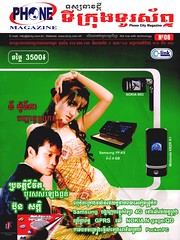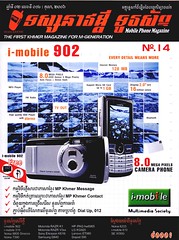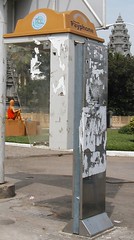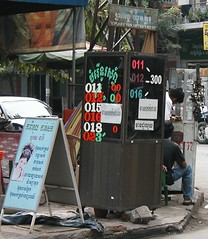Oct 23, 2006
 Tight Grip on 3G Phones
If you want to see someone from the States go from zero to angry in 5 seconds flat, just mention gun control. It's an issue that strongly divides people.
The USA is the world's biggest arms dealer. Is it any wonder it's awash in guns? There's a lucrative weapons industry with a big lobby. A popular bumper sticker on cars of gun enthusiasts: "You'll Take My Gun Away When You Pry It From My Cold, Dead Fingers"
But we're not talking about weighty issues today. We're talking about something light as a feather that fits in your hand. And something Southeast Asia is just as passionate about.
Cambodia sports at least two magazines specifically devoted to mobile phones, each costing no more than 4000 riel ($1). How can they afford this? Like music magazines, they are heavily subsidized by advertising. Years of war have resulted in Cambodia leapfrogging landlines to mostly mobile service.
As a foreigner I've come to the conclusion that a) urban Cambodians will always dress better than me (regardless of the heat) and b) virtually any Khmer person who has a phone will have one more tricked out than mine. (I haven't upgraded in four years. ) Phones are a very sexy personal accessory. Tight Grip on 3G Phones
If you want to see someone from the States go from zero to angry in 5 seconds flat, just mention gun control. It's an issue that strongly divides people.
The USA is the world's biggest arms dealer. Is it any wonder it's awash in guns? There's a lucrative weapons industry with a big lobby. A popular bumper sticker on cars of gun enthusiasts: "You'll Take My Gun Away When You Pry It From My Cold, Dead Fingers"
But we're not talking about weighty issues today. We're talking about something light as a feather that fits in your hand. And something Southeast Asia is just as passionate about.
Cambodia sports at least two magazines specifically devoted to mobile phones, each costing no more than 4000 riel ($1). How can they afford this? Like music magazines, they are heavily subsidized by advertising. Years of war have resulted in Cambodia leapfrogging landlines to mostly mobile service.
As a foreigner I've come to the conclusion that a) urban Cambodians will always dress better than me (regardless of the heat) and b) virtually any Khmer person who has a phone will have one more tricked out than mine. (I haven't upgraded in four years. ) Phones are a very sexy personal accessory.
 So how does an urban Phnom Penhois earning $100-$200 a month afford a $400 phone?
So how does an urban Phnom Penhois earning $100-$200 a month afford a $400 phone?
- Gift from family - nice phone but often they're low on calling credit.
- Bought with credit - if necessary it can be sold and the simcard kept.
Young people will do virtually anything to have the latest phone, even if they can't afford to use it regularly. That's why I knew the proposed ban on 3G phones would be revoked. Sure, many Cambodians turned in their guns after years of war, but You'll take my 3G phone when you pry it out of my cold, dead fingers!
To save money? People pocket their precious totem and call via a street phone stall. I know people with phones worth hundreds of dollars, but I never recognize their call until I hear their voice.

 Street phones? There are some rather lonely looking Camintel phone booths that you can use via a prepaid card - they work pretty much like public phones in Australia and that's no coincidence. Apparently during UNTAC the Australians were heavily involved in setting up telecommunications infrastructure.
The booth of popular choice though is one that has a phone for every mobile carrier. It's an intriguing model of small enterprise. The proprietors buy high denomination phone cards and pass some of the savings on to their customers.
Muhammad Yunus recently won the Nobel Prize for his Grameen Bank loan approach, and has pioneered a 'village phone' system for Bangladesh's most remote villages. So far as I can see, Cambodia is closing the gap; the 'village phone' model is already being implemented here, adhoc.
Tags: Cambodia,phone Street phones? There are some rather lonely looking Camintel phone booths that you can use via a prepaid card - they work pretty much like public phones in Australia and that's no coincidence. Apparently during UNTAC the Australians were heavily involved in setting up telecommunications infrastructure.
The booth of popular choice though is one that has a phone for every mobile carrier. It's an intriguing model of small enterprise. The proprietors buy high denomination phone cards and pass some of the savings on to their customers.
Muhammad Yunus recently won the Nobel Prize for his Grameen Bank loan approach, and has pioneered a 'village phone' system for Bangladesh's most remote villages. So far as I can see, Cambodia is closing the gap; the 'village phone' model is already being implemented here, adhoc.
Tags: Cambodia,phone
. . .
|
. . .
|